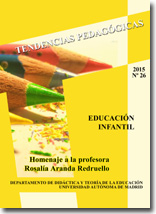La percepción de estudiantes egresados de magisterio en la Universidad Autónoma de Madrid sobre su competencia profesional para ser “profesorado inclusivo”: un estudio preliminar
Palavras-chave:
ompetencias educativas, educación inclusiva, formación inicial del profesorado, educación infantil, educación primariaCopyright (c) 2015 Tendencias Pedagógicas

Este trabalho está licenciado sob uma licença Creative Commons Attribution-NonCommercial 4.0 International License.
Resumo
Este trabajo, que es un estudio preliminar en el marco de un proyecto más amplio, tiene por objetivo conocer la percepción de competencia profesional para ser profesorado capaz de afrontar los retos vinculados a la educación inclusiva, por parte de recién egresados de los Grados de Maestro en Educación Infantil y Educación Primaria en la Universidad Autónoma de Madrid. Se ha contado con la participación de 86 egresados. La información se ha recogido a través de un cuestionario elaborado ad hoc en torno, fundamentalmente, a las dimensiones contempladas en el Perfil de Competencias del Profesorado Inclusivo resultado del proyecto “Formación del Profesorado para la Inclusión” (Agencia Europea para el Desarrollo de las Necesidades Educativas Especiales y la Educación Inclusiva, 2012). Los resultados muestran las principales fortalezas y debilidades percibidas en estas competencias.
Downloads
Referências
AEDNEEI (2011) Formación del profesorado para la educación inclusiva en Europa – Retos y oportunidades. Odense, Dinamarca: Agencia Europea para el Desarrollo de la Educación del Alumnado con Necesidades Educativas Especiales. Recuperado de
AEDNEEI (2012). Formación del profesorado para la educación inclusiva. Perfil profesional del docente en la educación inclusiva. Odense, Dinamarca: Agencia Europea para el Desarrollo de la Educación del Alumnado con Necesidades Educativas Especiales. Recuperado de http://www.europeanagency.org/publications/ereports/te4i-profile/te4i-profile-of-inclusiveteachers
Ainscow, M. (1995). Necesidades Especiales en el Aula. Guía para la formación del profesorado. Madrid: Narcea/UNESCO (2001, 3ªed.)
Ainscow, M., Booth, T., y Dyson, A. (2006). Improving schools, developing inclusion. Londres: Routledge.
ANECA (2004) Libro Blanco del Título de Grado en Magisterio, (2. Volúmenes) Recuperado de
http://www.aneca.es/var/media/150404/libroblanco_jun05_magisterio1.pdf
Arthur Kelly, M.; Sutherland, D.; Lyons, G. Macfarlane, S. & Foreman, Ph. (2013) Reflections on enhancing pre-services programmes to support inclusion: perspectives from New Zeeland and Australia. European Journal of Special Needs Education, 28(2): 217–237.
De Boer, A. ; Jan Pijl, S. y Minnaert, A. (2011). Regular primary schoolteachers’ attitudes towards inclusive education: a review of the literature. International Journal of Inclusive Education, 15 (3), 331-353.
Booth, T. (2006). Manteniendo el futuro con vida; convirtiendo los valores de la inclusión en acciones. En M.A. Verdugo y F.B. Jordán de Urríes (Coords.), Rompiendo inercias. Claves para avanzar. VI Jornadas Científicas de Investigación sobre Personas con Discapacidad (pp. 211-217). Salamanca: Amarú.
Booth, T., y Ainscow, M. (2011). Index for Inclusion. Developing learning and participation in schools Bristol: CSIE. (3ª Ed.).
Echeita, G. (2012). Competencias esenciales en la formación inicial de un profesorado inclusivo. Un proyecto de la Agencia Europea para el Desarrollo de las Necesidades Educativas Especiales. Tendencias Pedagógicas, 19, 7-24.
Echeita, G. (2013). Inclusión y Exclusión Educativa. De Nuevo, "Voz y Quebranto" REICE. Revista Iberoamericana sobre Calidad, Eficacia y Cambio en Educación, 11(2), 99-118. Recuperado de:
http://www.rinace.net/reice/numeros/arts/vol11num2/art5.pdf
Echeita, G. (2014). Educación para la inclusión o educación sin exclusiones. Madrid: Narcea (3ªed).
European Agency for Development in Special Needs Education (2010). Teacher Education for Inclusion. International Literature Review. Available in, http://www.europeanagency.org/sites/default/files/TE4ILiterature-Review.pdf
Foreman, Ph. (2011). Inclusion in Action. South Melbourne: Cengage Learning (3ª Ed.)
Florian, L. y Linklater, H. (2010). Preparing teachers for inclusive education: using inclusive pedagogy to enhance teaching and learning for all.Cambridge Journal of Education, 40(4), 369-386.
Forlin, C. (2012). Future Directions for Inclusive Teacher Education. An international perspective. Abingdon: Routledge.
Loreman,T.; Earle, Ch.; Sharma U. y Forlin Ch. (2007). The development of an instrument for measuring pre-service teachers’ sentiments, attitudes, and concerns about inclusive education. International Journal of Special Education, 22(2), 150-159.
Martín, E. y Cervi, J. (2006). Modelos de formación docente para el cambio de concepciones en los profesores En J. I. Pozo, N. Scheuer, M. P. Pérez Echevarría, M. Mateos, E. Martín & M. De la Cruz (Eds.), Nuevas formas de pensar la enseñanza y el aprendizaje. Concepciones de profesores y alumnos. Barcelona: Graó.
Shama, U.y Desai , I.(2002). Measuring Concerns about Integrated Education in India. Asia & Pacific Journal on Disability, 5(1), 2-14.
Sharma, U.; Ee, J y Desai (2003). A Comparison of Australian and Singaporean Pre-Service Teachers' Attitudes and Concerns About Inclusive Education. Teaching and Learning, 24(2), 207-217.
UNESCO (1994). Informe Final. Conferencia mundial sobre necesidades educativas especiales: acceso y calidad. Madrid: UNESCO/Ministerio de Educación y Ciencia.
UNESCO (2005). Guidelines for inclusion: Ensuring Access to Education for All. París: UNESCO. Recuperado de http://unesdoc.unesco.org/images/0014/001402/140224e.pdf
UNESCO (2008). Conclusiones y recomendaciones de la 48ª reunión de la Conferencia Internacional de Educación (CIE). Ginebra: UNESCO. Recuperado de
